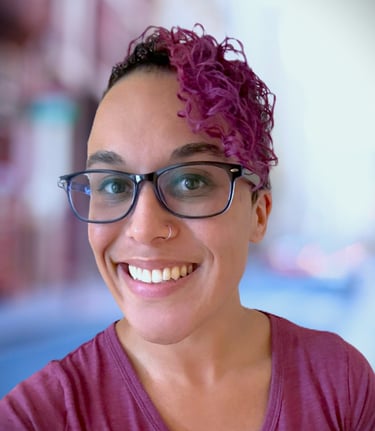New England Counseling and Consulting
Trauma & PTSD
We Understand Your Struggle
Living with trauma or PTSD can feel like you're carrying an invisible weight that no one else can see. Some days, you might wake up feeling like you can take on the world, only to find yourself overwhelmed by a seemingly harmless trigger hours later.
It's exhausting, isn't it? The constant vigilance, the unpredictable emotions, the feeling that no one really understands what you're going through.
These changes can be so gradual that we often don't notice them until we feel completely disconnected from the life we once knew. Here are some examples that may resonate with you:
Maybe you've noticed that you startle easily at loud noises, or that crowded places make you feel on edge.
You might experience physical symptoms like headaches or stomachaches
Maybe you find yourself in a cycle of perfectionism, trying to control every aspect of your life to feel safe.
Some people notice they have trouble making small decisions because the weight of potential consequences feels too heavy.
Trauma has a way of weaving itself into the fabric of our daily lives in ways we don't always recognize.


It's also common to feel a deep sense of shame or guilt, even when you know logically that what happened wasn't your fault. You might catch yourself thinking, "If only I had done something differently..." These thoughts can be paralyzing and keep you stuck in a loop of self-blame. But here's what we want you to remember: your reactions are valid.
Your body and mind are doing their best to protect you based on what you've been through.
We want you to know: you're not "crazy," you're not "weak," and you're certainly not alone.


With evidence based techniques like A.R.T and E.M.D.R, we can work together to help your brain process traumatic memories in a way that reduces their emotional impact. It's like untangling a knot, slowly and carefully, until you can breathe more easily.
TF-CBT (Trauma-Focused Cognitive Behavioral Therapy) is another powerful tool we can use. Together, we'll explore how your thoughts, feelings, and behaviors are connected. We'll work on developing new coping strategies and challenging the negative beliefs that trauma may have instilled in you.
The journey of healing isn't always easy, but you don't have to walk it alone. In our sessions, you'll have a safe space to express yourself without judgment. We'll move at your pace, honoring your experiences and your strength.
Healing is possible, and it looks different for everyone.




That's no small feat. Now, let's work together to help you thrive, not just survive.
You deserve to feel peace, joy, and connection again.
When you're ready to take that first step towards healing, our team of therapists are here for you. Reaching out for help is an act of courage and self-love.
Remember, you've already survived 100% of your worst days.


You've carried this weight for so long; let's start the journey of setting it down together.
Here's what our client's say:
"My therapist has helped me prioritize my own needs instead of stressing out about keeping everyone else happy. I didn't realize how much my people pleasing was due to my past."
”Learning how to set healthy boundaries has been life-changing for me. It’s helped me build stronger relationships and feel more confident in my everyday life.”


Frequently asked questions
Is online therapy effective for trauma and PTSD?
Yes, research shows that online therapy can be as effective as in-person therapy for many mental health issues, including trauma and PTSD. Our secure platform allows for confidential, convenient access to specialized trauma care from the comfort of your home.
How do I know if I have PTSD?
PTSD symptoms can include intrusive thoughts about the traumatic event, nightmares, flashbacks, avoidance of reminders, negative changes in thoughts and mood, and changes in physical and emotional reactions. If you're experiencing these symptoms for more than a month and they're interfering with your daily life, it's important to seek professional help. Our initial assessment can help determine if you might be experiencing PTSD.
How long does PTSD treatment typically last?
The duration of PTSD treatment can vary depending on the individual, the severity of symptoms, and the type of trauma experienced. Evidence-based treatments typically last 12-16 sessions. Other approaches may be shorter or longer. Our therapists work with you to create a personalized treatment plan and will regularly assess your progress. Remember, healing is a process, and everyone's timeline is different.
What if I'm not ready to talk about my trauma?
It's completely normal to feel hesitant about discussing traumatic experiences. Our therapists are trained to work at a pace that feels comfortable for you. In the beginning, therapy may focus on building coping skills and establishing a sense of safety before delving into traumatic memories. We believe in creating a safe, supportive environment where you have control over your healing journey. You'll never be forced to discuss anything you're not ready to share.
How can I support a loved one with PTSD?
Supporting a loved one with PTSD can involve:
1. Educating yourself about PTSD
2. Being patient and understanding
3. Listening without judgment
4. Encouraging them to seek professional help
5. Helping them maintain a routine
6. Being aware of potential triggers
7. Taking care of your own mental health
Remember, while your support is invaluable, professional help is often necessary for PTSD treatment. If you have questions, reach out to us and we can provide guidance on how to best support your loved one.
Get in touch


Counseling for teens & adults in CT and MA online counseling teen counseling affordable therapy LGTQ therapy Therapy for women
therapy in Boston
online therapy in MA
online therapy LGTBQ police officer therapy law enforcement therapy EMDR therapy trauma therapy in CT
trauma therapy in MA
New England Counseling and Consulting
Serving clients in MA and CT
11 Melanie Lane, Colchester, CT (mailing address only)
Email Office: Counseling@NewEnglandCC.org
Please note: We are able to respond more quickly to emails and text messages
Call or text our office: (508) 784-6425
Fax: 860-915-7065








